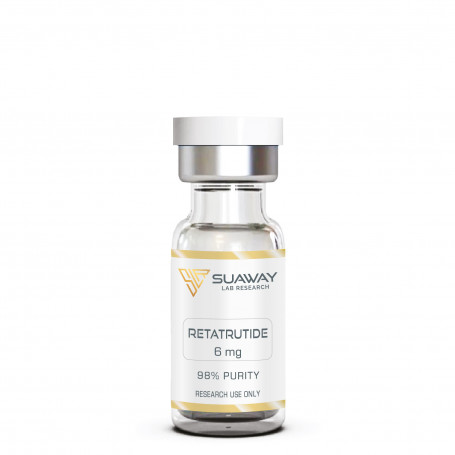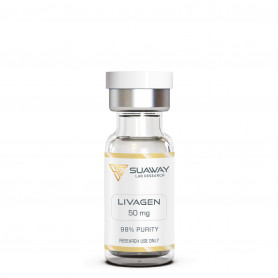RETATRUTIDE - 6mg
Retatrutide is a peptide characterized as a triple GGG agonist, targeting three key incretin receptors: GLP-1R (Glucagon-Like Peptide-1 Receptor), GIPR (Gastric Inhibitory Peptide Receptor), and GCGR (Glucagon Receptor). This multifaceted approach allows retatrutide to exert a comprehensive influence on metabolic processes, including enhancing satiety signals, slowing gastric emptying, and increasing the breakdown of stored fats and glycogen.
Description
STRUCTURE
Sequence: YA1QGTFTSDYSIL2LDKK4AQA1AFIEYLLEGGPSSGAPPPS3
Molecular Formula: C223H343F3N46O70
Molecular Weight: 4845.44 g/mol
CAS Number: 2381089-83-2
Peptide purity: Greater than 98%
No TFA salt
Storage: Lyophilized peptide must be stored at -20°C and peptide solution at +4°C.
DESCRITPION
Retatrutide represents a groundbreaking advance in the field of endocrinology and metabolic disorders. This peptide is classified as a GGG tri-agonist, signifying its innovative mechanism of action where it simultaneously targets three critical receptors: the Glucagon-Like Peptide-1 Receptor (GLP-1R), the Gastric Inhibitory Polypeptide Receptor (GIPR), and the Glucagon Receptor (GCGR). Engineered on the basis of the GIP peptide structure, retatrutide has undergone extensive modifications.
These alterations not only enhance its biological efficacy but also significantly improve its profile, such as the ability to bind to albumin, ensuring a longer half-life and allowing its use once a week.
Incretin Receptor Activity
Retatrutide's multifaceted action stems from its engagement with several incretin receptors, each contributing to its comprehensive therapeutic effects. The GIPR, primarily located within the central nervous system and the gastrointestinal (GI) tract, plays pivotal roles in hunger regulation and the sensation of satiety. By modulating signals that communicate fullness from the GI tract to the brain, retatrutide addresses one of the fundamental aspects of appetite control.
The activation of the GLP-1R by retatrutide slows gastric emptying, a critical factor in reducing food intake and thereby aiding in energy consumption management. This receptor's targeting has not only shown promise in treating type 2 diabetes but also in contributing to weight management and the reduction of cardiovascular risk factors. Furthermore, investigations into its potential applications in treating depression, addiction, polycystic ovarian syndrome, and non-alcoholic fatty liver disease are ongoing, highlighting the versatility of retatrutide's action.
The engagement with the GCGR, predominantly found in the liver and kidneys, amplifies glucagon production. This hormone plays a crucial role in mobilizing stored energy sources, such as fat and glycogen, thus fostering an increase in basal metabolism and promoting weight and fat loss even during rest periods.
Comprehensive Effects on Metabolism and Appetite Control
Research underscores retatrutide's potent agonistic action across all targeted incretin receptors, making it a formidable agent in the control of gastric emptying and hunger management. Its efficacy in reducing fat mass significantly surpasses that of similar peptides, attributed largely to its capacity to modulate basal metabolism and counteract the hormonal dynamics that sustain obesity.
The peptide's ability to diminish energy intake through delayed gastric emptying and enhanced central regulation of hunger signals constitutes a substantial portion of its therapeutic benefits. Nonetheless, its role in boosting energy expenditure is also noteworthy, further solidifying retatrutide's comprehensive approach to weight management.
Weight Loss and Metabolic Health
Clinical research attests to retatrutide's superiority among incretin-based peptides for weight reduction, demonstrating remarkable efficacy in both animal studies and human trials. Notably, its capacity to induce significant weight loss at lower doses than its counterparts, such as semaglutide, suggests a promising alternative for patients sensitive to the adverse effects of other medications.
Impact on Diabetes Management
Retatrutide's influence extends to glycemic control, where it has shown potential in significantly reducing hemoglobin A1c levels, a marker of long-term blood glucose management. This effect underscores its utility in diabetes management, particularly in mitigating the risk of complications associated with prolonged hyperglycemia.
Cardiovascular Health Implications
Preliminary investigations, including a study conducted on cynomolgus monkeys, indicate potential cardiovascular benefits of retatrutide. While direct human research remains scarce, the existing data suggest that retatrutide could play a role in improving cardiac function and potentially offering protective effects against cardiovascular disease, particularly in the context of metabolic disorders.
Conclusion and Future Directions
Retatrutide emerges as a highly potent incretin mimetic with a unique triple-receptor agonist profile, distinguishing it as a potentially transformative agent in the treatment of obesity, diabetes, and possibly cardiovascular disease. Its comprehensive mechanism of action, characterized by significant weight loss efficacy, improved metabolic parameters, and potential cardiovascular benefits, positions retatrutide as a subject of intense scientific interest and clinical investigation.
REFERENCES
A. Ray "Retatrutide: a triple incretin receptor agonist for obesity management" [PubMed]
A.M. Jastreboff et al., "Triple-Hormone-Receptor Agonist Retatrutide for Obesity - A Phase 2 Trial" [PubMed]
S.A. Doggrell "Is retatrutide (LY3437943), a GLP-1, GIP, and glucagon receptor agonist a step forward in the treatment of diabetes and obesity?" [PubMed]
S.A. Doggrell "Retatrutide showing promise in obesity (and type 2 diabetes)" [PubMed]
M. Kaur et al., "A review of an investigational drug retatrutide, a novel triple agonist agent for the treatment of obesity" [PubMed]
E. Harris "Triple-Hormone Combination Retatrutide Induces 24% Body Weight Loss" [PubMed]
M. A. Elfeki et al., "Triple-Hormone-Receptor Agonist Retatrutide for Obesity" [PubMed]
J. Rosenstock et al., "Retatrutide, a GIP, GLP-1 and glucagon receptor agonist, for people with type 2 diabetes: a randomised, double-blind, placebo and active-controlled, parallel-group, phase 2 trial conducted in the USA" [The Lancet]
DISCLAIMER
This product is intendend for lab research and development use only. These studies are performed outside of the body. This product is not medicines or drugs and has not been approved by the FDA or EMA to prevent, treat or cure any medical condition, ailment or disease. Bodily introduction of any kind into humans or animals is strictly forbidden by law. This product should only be handled by licensed, qualified professionals.
All product information provided on this website is for informational and educational purposes only.












